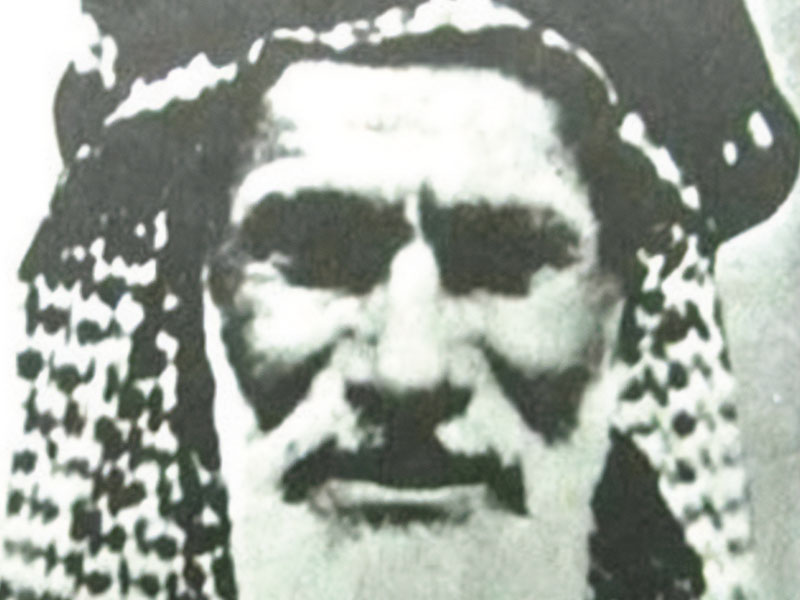A Word from the Editor Nabati Poems and Folk Songs
Issue 48

Five to six years is the interval between the death and the birth of three of the most important folk poets in the Gulf and the Arabian Peninsula. It was as if destiny was drawing the line of evolution for this kind poetry and its language. Contemplate my dear reader, the birth and death of these three poets who left their own imprints on the poetic text of the desert and the city, its spread and its continued impact on folk conscience throughout these years, keeping their memory and poetry alive in our minds eternally.
The three poets are the Saudi poet, Mohammed bin La’bun (1790-1831), the Kuwaiti poet, Abdullah Al-Faraj (1836-1901), and the Qatari poet Mohammed bin Jassim Al-Faihani (1907-1939).
These poets played a vital role in the development of the vocabulary of the Gulf folk song. It was as if they relayed the role, each handing the torch to he who came after him.
Mohamed Bin La’bun came from the desert of the Central Najd. Where Nabati poetry is characterized by the original Bedouin language and a vocabulary so peculiar to the desert; it is usually sung and accompanied by the Rebab, to the awe and limited understanding of the urban listener. Bin La’bun was a passionate player of the Rebab and Goblet drum. He moved to Bahrain, the eastern end of the Arabian Peninsula, where the eloquent Gulf dialect, characterized by softness and simplicity, is spoken and where the singing arts "Al-Khamari" and "Al Samiri" flourished.
In Bahrain he found the mixed folklore bands widespread, which made it a fertile ground for the performance arts of the Tar (drum). Bin La’bun mastered the Tar and created his own melodies, which were named “La’buniyyat”.
As for the Nabati poet Abdullah Al-Faraj, he was brought up in India where he studied and mastered Hindi which is wide, diverse, and rich in melody and rhythm. He also studied music and showed high desire for painting and photography. He absorbed the Indian culture, and after he spent the fortune he inherited from his wealthy father he moved to Bahrain. He wanted to take part in the flourishing folk singing arts and the atmosphere of artistic openness, so he became very active in the literary and artistic movement and contributed to Nabati poetry, as well as the Mawwal and Sawt Singing art.
The poet Mohammed al-Faihani was a sailor from a well-off family of a coastal city that was flourishing in the pearl industry. This industry has been associated with a rich legacy of music and songs. Disappointment had engulfed his life and his poetry was a result of not being able to marry the girl he loved. He suffered from the ingratitude and rejection of those he trusted. Tormented by his emotions, al-Faihani wrote the delicate love poems, most of which were turned into songs that became very famous.
This fascinating poetic, lyrical and human combination, and this elaborate historical sequence, have transferred the rich language of the folk poem from the Bedouin Nabati into Central Arabia and the cities where softness of melody and diversity existed. Anyone who reads the poetry of Bin La’bun written before his coming to Bahrain (and getting involved in its artistic atmosphere) and compares it to the lyrics of his song "O Ali, I cried …..O woman do not remove the veil", which is one of the most popular songs across the Gulf and the Arabian Peninsula and echoed by the famous singers. will discover the vast difference between his previous poetry and his poetry composed in Bahrain.
As for the Mawwal, a long-standing art of the sea workers in the Gulf, we find Abdullah Faraj at the forefront of poets with his poetic texts. His poetry became proverbs, such as the famous hemistich which was frequently repeated by people: "Fire burns only the foot who steps on it." In addition, the role of Abdullah Al Faraj as an Oud player, in the evolution of this famous "sound" art of the Gulf region, cannot be overlooked.
The Qatari poet Faihani’s love story of "Mai” is one of the most famous love stories in the Arabian Gulf. His beautiful poems are sung by the greatest singers of the Gulf. Its verses are perfectly written to describe the transition from the desert to the city. The people of the Arabian Gulf cannot forget the lyrics of the song “Enough we had from their pain and quenched our thirst…” from one of his poems, along with many other poems that were turned into folk songs and are still present in folk memory.
It is hardly possible in this narrow space to explore the paths of the development of the Nabati poetry in the Gulf colloquial poem and its shift from the desert to the city, as well as to highlight the evolution of Nabati poetry into the modern day poetry we find in the poems of H.H. Prince Khaled Al-Faisal, and H.H. Prince Bader bin Abdulmuhsin and others, whose poetry is sung by Saudi singers and is so popular in the Gulf and the Arab world.
Will there be an expert researcher in the Arab world to address such important areas of study, which are necessary for future generations?
We look forward and hope.
Ali Abdullah Khalifa
Chief Editor


































































